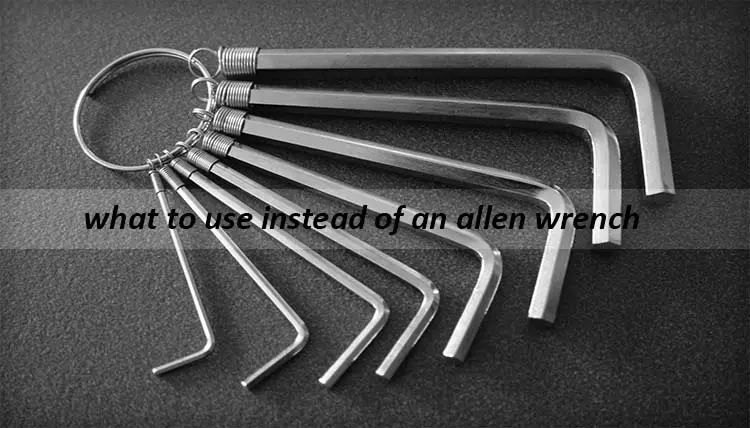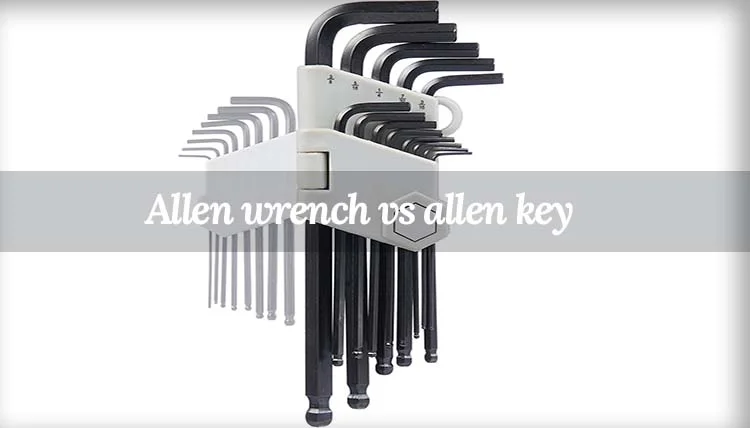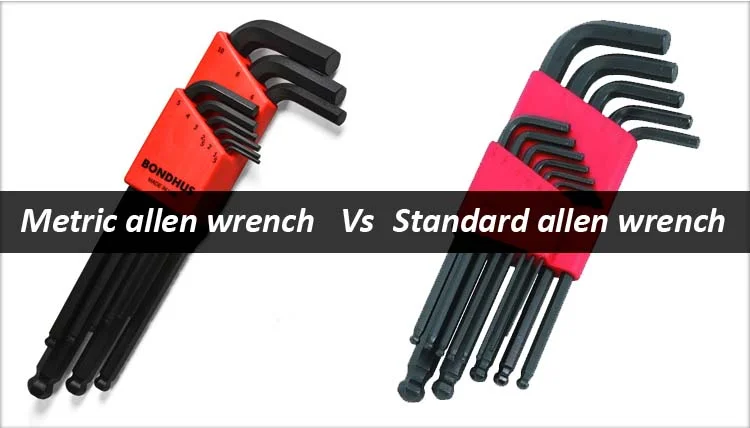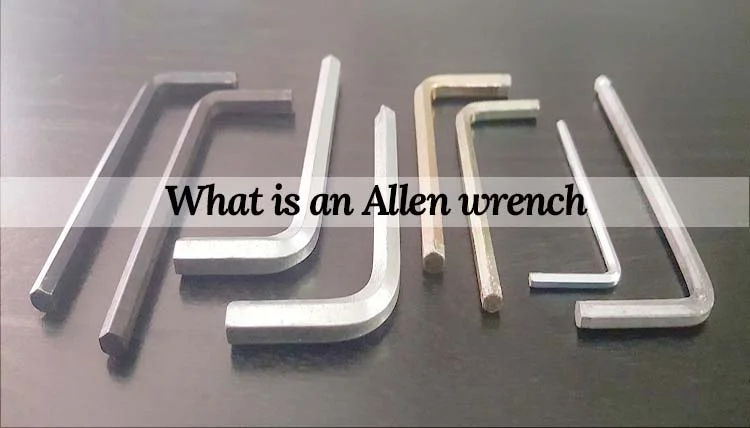If you’re a DIY enthusiast or just someone who likes to work around things at home, you’ve probably encountered a situation where you needed to use an Allen wrench, also known as a hex key. These L-shaped tools are great for reaching tight spaces and applying torque to fasteners with hexagonal sockets.
But what happens if you find yourself without one? Don’t panic! Depending on your needs and preferences, many alternatives can help get the job done, from screwdrivers and pliers to socket wrenches and impact drivers. In this article, we’ll explore some of the top alternatives to Allen wrenches and help you determine which tool is right for your project.

What are some alternatives to an Allen wrench when you don’t have one?
There are 14 alternatives to an Allen wrench that you can use when you don’t have one in hand-
1. Flathead screwdriver
Using a flathead screwdriver is the perfect solution to this problem. A screwdriver is a handheld tool that is used to turn screws. It consists of a handle and a shaft with a flat or cross-shaped tip that fits into the head of a screw.
Simply place the blade of the screwdriver into the center of the screw head and turn it anti-clockwise. This should give you enough grip to loosen the screw, allowing you to finish whatever job you were working on quickly. The next time you find yourself trying to loosen a screw and don’t have an Allen wrench handy, consider using a flathead screwdriver!
2. Pliers
If you need to unscrew apart from your device, but an Allen wrench isn’t the solution, don’t fret! Pliers can provide alternative assistance. By using pliers for leverage and gaining a better grip on the screw, you will increase your chances of success in loosening it. Pliers are often easier to come across and more versatile too!
3. Drill
If you come across a screw that has become stripped and won’t turn, don’t worry – there’s still a way to get the job done. For this type of situation, try using a drill with a bit that is the same size as the screw head. This alternative allows for a secure fitting and allows you to complete your project without difficulty. Save time and energy by utilizing this method next time you find yourself stuck with a stripped screw!
See Also: What Size Allen Wrench to Tighten Moen Kitchen Faucet Handle?
4. Box-end Wrench
Another option is a box-end wrench. A box-end wrench is a type of hand tool that is used to turn bolts and nuts. It has a closed end that fits around the head of a fastener and a handle that allows for greater torque to be applied. A box-end wrench can be used in place of an Allen wrench by inserting the closed end into the hexagonal socket of a bolt or screw. One advantage of using a box-end wrench is that it can grip onto rounded bolts that may be difficult for an Allen wrench to hold onto. Additionally, a box-end wrench can apply more torque than an Allen wrench, making it a helpful tool for loosening or tightening stubborn bolts.
5. Phillips head screwdriver
A Phillips head screwdriver won’t fit precisely into various sizes of Allen screw hexagonal heads as an Allen wrench does. Its curved tip will fit snugly enough in most Allen screws to loosen and tighten them securely. To get the best result when using a Phillips head screwdriver, make sure that its tip fits snuggly into the screw head and use even pressure when turning to avoid any stripping of either the head or bit of the screwdriver.
6. Torx Key
Using a Torx key as an alternative to an Allen wrench can be a safe solution for many tasks which require fastening or loosening small nuts, bolts, and screws. With a simple design consisting of ‘star points’ across its surface, Torx keys are known for their strength and reliability. They come in different sizes and can help provide more torque than an Allen wrench when applied with the same force. With the proper care and maintenance, it is possible to use Torx keys to complete multiple additional repair tasks.
7. Torque wrench
A torque wrench is an excellent alternative to an Allen wrench for specific tasks. It offers greater precision and accuracy when fastening screws or nuts and provides more torque than a typical Allen wrench. However, it is essential to be careful not to apply over-torque, as this can cause damage to the material or item being worked on. Additionally, torque wrenches are often bulkier and less portable than an Allen wrench, so you’ll want to consider this if accessibility is a concern. Ultimately, a torque wrench may be the better option in some cases, while an Allen wrench may be suitable in others.
8. Ratchet wrench
A ratchet wrench can be a suitable alternative to an Allen wrench when working on certain projects around the house. An Allen wrench has its advantages, such as its L-shaped 90-degree angle, giving it increased access in tight spots and the ability to apply tremendous amounts of torque without removing it from a bolt or nut. However, many find its small size challenging to handle and maneuver. If that is the case, then a ratchet wrench is used instead for its larger and easier-to-hold head. In terms of safety, as long as deep sockets are securely connected and torqued correctly, these tools can be safe under normal use cases.
9. Impact wrench
Using an impact wrench as an alternative to an Allen wrench is possible and can be safe and effective in certain situations. Impact wrenches provide a more powerful and higher torque than regular Allen wrenches, making them capable of quickly and easily loosening stubborn fasteners.
However, it is important to note that impact wrenches should never be used for precision work where accuracy is critical. Due to the high torque output, there is a risk of damaging parts or stripping fasteners when improperly used. With proper safety measures put in place, it can be a great alternative to an Allen wrench in many circumstances.
10. Knife
While it’s possible to use a kitchen knife as an alternative to an Allen wrench, it’s not necessarily the best or safest option. This is because kitchen knives are relatively fragile tools due to their thin blades and lack of leverage when compared to an Allen wrench. Employing a kitchen knife for tasks that generally require an Allen wrench may cause excessive wear and tear on the blade, or worse yet, the blade could bend or break during use. In general, avoiding using a kitchen knife instead of an Allen wrench yields far better and safer results in any situation.
11. Crowfoot wrench
While an Allen wrench is the ideal tool for various tasks, you can use a Crowfoot wrench as an alternative. This type of wrench works well in tight spaces where it’s impossible to use conventional wrenches. However, it’s important to note that a Crowfoot wrench is non-ratcheting, so more force will be needed before it loosens and tightens fasteners.
Additionally, the lack of leverage means that painting too much torque could lead to stripped fasteners and even broken tools in some cases. As long as care is taken with how much pressure you apply when procedures call for an Allen wrench, a Crowfoot wrench can be safely used as an alternative.
12. Nut Driver
A nut driver is similar to a screwdriver, but it has a hexagonal socket on the end of the shaft instead of a flat or cross-shaped tip. This allows the nut driver to fit onto various sizes of nuts and bolts with hexagonal sockets. Like a box-end wrench, a nut driver can apply more torque than an Allen wrench, making it a valuable tool for tightening or loosening stubborn bolts.
13. Multi-tool
A multi-tool is another alternative that can be used in place of an Allen wrench. A multi-tool is a portable hand tool with multiple functions, such as pliers, a knife, a screwdriver, and often an Allen wrench. Some multi-tools even have a built-in nut driver or box-end wrench. A multi-tool is convenient because it allows several tools in one compact device. This can be especially useful for tasks that require multiple types of tools or for situations where you don’t have access to a complete toolbox.
14. Open Ended Wrench
An open-ended wrench is a viable alternative to an Allen wrench for specific situations and tasks. Open-ended wrenches come in various sizes, so it’s essential to try and find one that will fit any necessary bolts or nuts. They can be a good choice when there is limited space around the area you are working. They will fit over what needs tightening or loosening relatively quickly.
However, it would be wise to double-check if an open-ended wrench is suitable for the task at hand before you begin working. Most of the time, this type of wrench may not provide enough torque or grip, which could make your project more complicated than necessary.
Conclusion
Finally, there are several alternatives to using an Allen wrench that can be just as effective and efficient. It’s best to have multiple tools in your toolbox, and these alternatives can be a great addition to your arsenal. So next time you reach for that Allen wrench, consider trying one of these alternatives and see if it gets the job done just as well.



